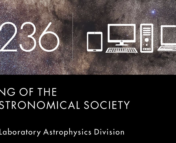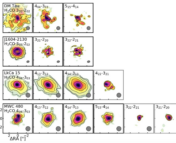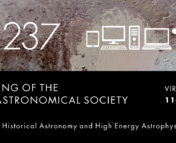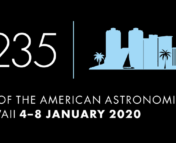In this series of posts, we sit down with a few of the keynote speakers of the 238th AAS meeting to learn more about them and their research. You can see a full schedule of their talks here, and read our other interviews here!
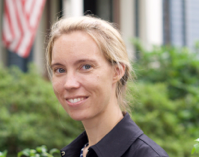
Astronomy is often thought of as a field which focuses on the untouchable. The objects we study are far away, and astrophysical processes are often difficult or impossible to replicate on Earth. Dr. Karin Öberg of the Harvard-Smithsonian Center for Astrophysics, and selected speaker for the AAS Laboratory Astrophysics Division plenary lecture, thinks otherwise. Dr. Öberg specializes in astrochemistry, a truly interdisciplinary field which utilizes both telescope observations and lab experiments on Earth to understand the behavior of molecules in our universe.
Born and raised in Sweden, Dr. Öberg began eyeing universities in the United States as a teenager. Her undergraduate journey took her to Caltech, where she started out intending to study chemical engineering. However, in the United states “studying engineering means you have to really like engineering,” which, for Dr. Öberg, was not the case. As she moved forward in her degree, Dr. Öberg discovered that physics and astronomy had the most interesting questions, the questions she was passionate about. However, chemistry was where she felt she had the most talent. She attempted to double major in physics and chemistry but ultimately decided to drop her physics major.
Luckily, Dr. Öberg learned that there was a backdoor into astronomy through astrochemistry. At the end of her sophomore year, she conducted an astronomy research project using the Keck Telescopes to study molecules around massive stars. After that experience, “I never really looked back. I had found the rare experience of being able to identify a career where I both felt passionately about the subject and I had found a set of tools that I was really good at.” With clarity surrounding her career, Dr. Öberg optimized the rest of her time at Caltech for pursuing work in astrochemistry. She remarks that took a lot of extra physics and math courses, “but now with much less pressure, since I was no longer a physics student.”
The next step in her education took Dr. Öberg back to Europe, to Leiden University in the Netherlands. Leiden was (and still is) a hub for astrochemistry research, and was the ideal place for Dr. Öberg to conduct her graduate research on laboratory astrochemistry. Towards the end of her PhD, Dr. Öberg found that working on astronomy problems using both observations and laboratory experiments was where she produced her best work, and she has carried that through to today. “I find that [observations and experiments] have very complimentary frustrations as well as positives.” Commenting on the positives of laboratory work, Dr. Öberg remarks that “there is something really beautiful about how you can have an idea, and then you can actually tune [an] experiment to test it… and you can rerun it multiple times with slightly different tunings to [get really precise insight on a process].“ On the other hand, “the frustration [in laboratory experiments] is that your instrument often breaks, it’s often your fault, and it’s up to you to fix it.” With observational astronomy, the joys are quite different. “I love [it]… because nature just gives you the data. You cannot change [it], all you can do is figure out how to read the data, for better or for worse. There’s something about this constrained way of working that’s also beautiful.”
Now a professor at Harvard, Dr. Öberg’s research focuses primarily on two central topics: life on other worlds and the chemical evolution of planets. She’s particularly interested in the chemical processes that enable the existence of life and how studying those processes feed into our understanding of the origin of life on Earth. As is expected, much of her work overlaps with the exoplanet field, where she’s interested in the cause of the chemical abundances and compositions some exoplanets exhibit. Dr. Öberg’s talk next week will focus on how laboratory tools and experiments help answer these big questions, specifically how we can use the laboratory to build better datasets of molecules and their interactions. She emphasizes the importance of lab experiments whenever they’re possible – something that’s rather rare in astronomy. However, even in cases where you get a single lab measurement to benchmark a model, it can be extremely valuable.
For students who are interested in interdisciplinary and cross-disciplinary research, Dr. Öberg highlights the importance of figuring out the scientific questions that drive you and the tools you enjoy working with. She notes that these questions usually land more in one field than the other, and this will tell you the kind of department you want to be in. For Dr. Öberg, her favorite questions were astrophysical. Even though she has a chemistry background, because of her interest in astrophysical questions, she has spent her career in astronomy departments. Dr. Öberg also says that regardless of the department you end up in, you will need to spend time learning how two fields operate. Although this is a significant time investment, once you have that expertise, you’re going to be able to tackle problems from unique angles, and have unique toolkits to address those problems.
Finally, and this goes for all students regardless of field, Dr. Öberg emphasizes the importance of building up a mentoring network early in your career. A great way to do this is by having conversations with speakers at conferences (like the upcoming AAS meeting)! Even though asking questions can be nerve wracking, reaching out to speakers or asking your advisor to introduce you to someone you admire in your field is a great way to start building those connections.
To hear more about Dr. Öberg’s work, check out her talk, Origins of Astrochemical Complexity at 11:00 am ET on Tuesday, June 8th at #AAS238.
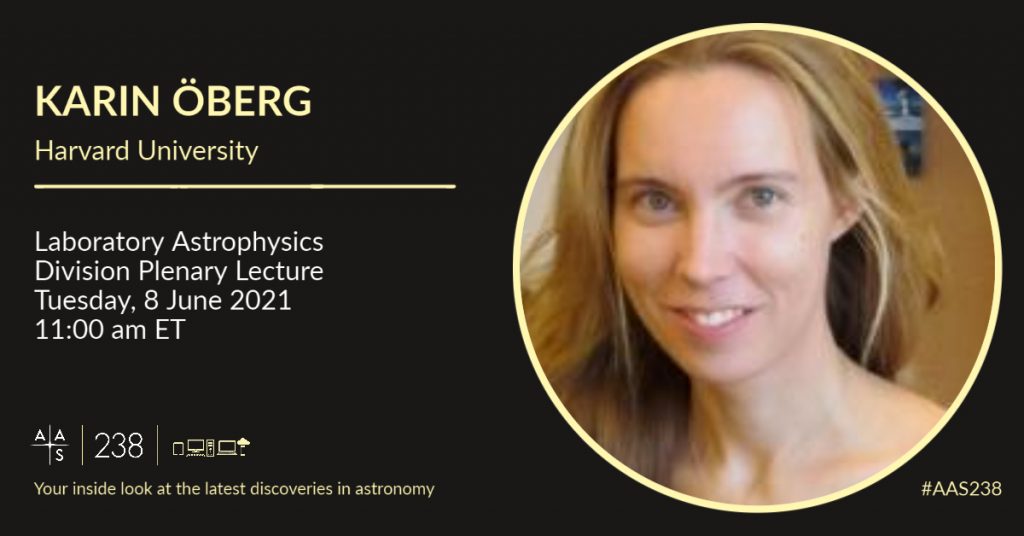
Astrobite edited by Pratik Gandhi
Featured image credit: AAS

